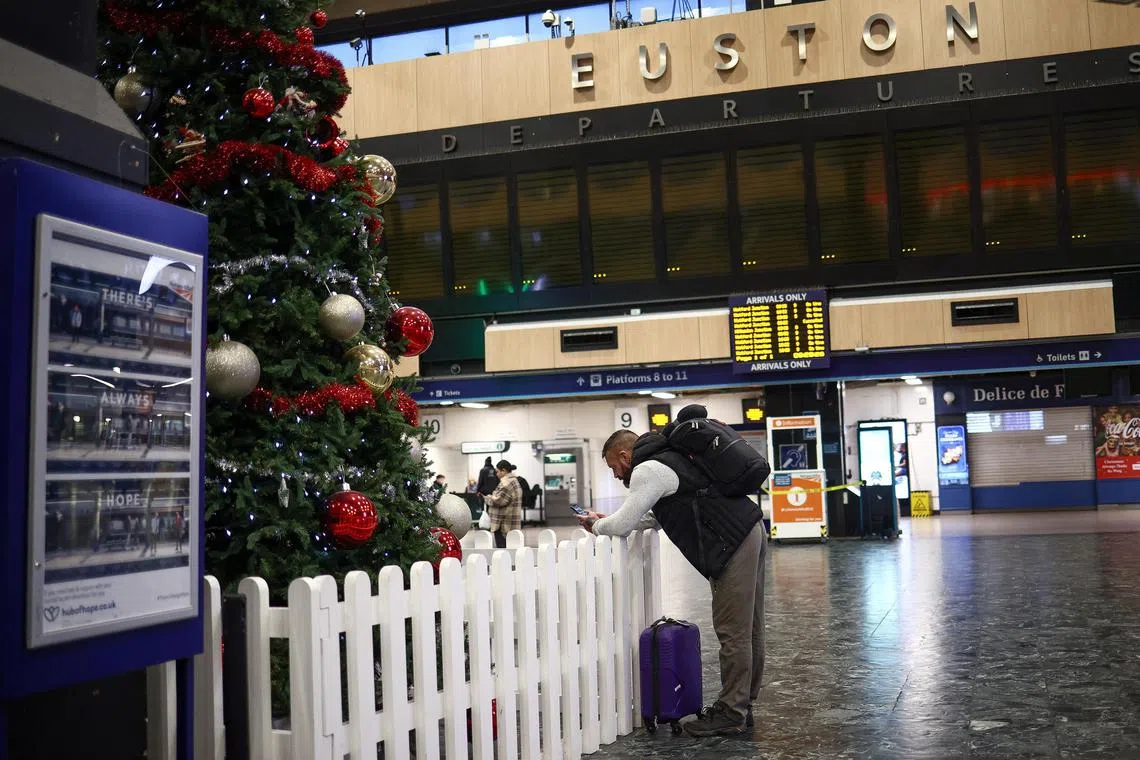Britain to introduce law to curb strikes in key sectors
Sign up now: Get ST's newsletters delivered to your inbox

A person in front of a blank departure screen at Euston station, as rail workers go on strike in London, on Jan 5, 2023.
PHOTO: REUTERS
LONDON - Britain will introduce legislation to ensure key public services maintain minimum safety levels during industrial action.
This comes as the government seeks to limit disruption from strikes now involving tens of thousands of workers.
The government said on Thursday that it would take the Bill to Parliament in the coming weeks and would consult on the minimum safety levels to be set for fire, ambulance and rail services.
“While we hope that voluntary agreements can continue to be made in most cases, introducing minimum safety levels... will restore the balance between those seeking to strike and protecting the public from disproportionate disruption,” business minister Grant Shapps said.
The Bill could still take months to become law, and Mr Shapps told Sky News shortly after the announcement that the timing would be a matter for Parliament itself.
Prime Minister Rishi Sunak, who took office less than three months ago, has been under pressure to do more to resolve a wave of industrial action by workers demanding better pay across crucial sectors from healthcare to transport.
Mr Sunak on Friday said he was hoping for “a grown-up, honest conversation” with trade union leaders on “affordable” pay on Monday.
Pay rises have failed to keep up with double-digit inflation, which is now around 40-year highs, prompting strikes by nurses, ambulance staff, rail workers and others. Some London bus drivers went on strike on Thursday, while rail staff across the country have held walkouts most days this week.
The government has called on unions to cancel strikes while it holds talks, and has argued that inflation-matching pay rises will only fuel further price increases and cause interest rates and mortgage payments to go up further.
The opposition Labour Party, which has a strong lead in opinion polls over Mr Sunak’s governing Conservatives, has said it would repeal the law if it takes power. A national election is expected in 2024.
“These proposals are unworkable and unserious from a dead-end government,” Labour deputy leader Angela Rayner said. “It’s insulting to key workers that Rishi Sunak thinks that threatening teachers and nurses with the sack will end strikes.”
GMB, one of Britain’s largest trade unions, called the legislation an attack on the fundamental right to take strike action. “We are always ready to discuss our members’ pay, but the government is refusing to talk about problems as they exist now. Instead, they want to kick the can down the road,” said its general secretary Gary Smith.
Meanwhile, British shops enjoyed their best festive season since the start of the pandemic, as visitor numbers held up despite widespread train strikes.
Foot traffic rose 15 per cent compared with December 2021, according to data from the British Retail Consortium. Postal strikes meant shoppers visited stores at the last minute to buy gifts, it said.
Rail workers held a series of strikes in the middle of December, and more over Christmas and the days after that, leading to fears that retailers could suffer. But while numbers were still down on pre-Covid-19 levels, the drop was less sharp than in previous months.
There was a significant improvement on 2021 when the Omicron variant of Covid-19 deterred shoppers from mixing in public, the British Retail Consortium said. REUTERS, BLOOMBERG


